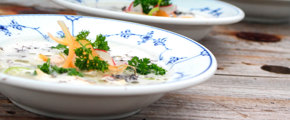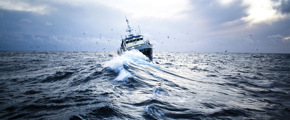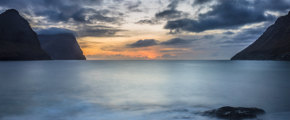The Legacy - a Fishing Nation with Proud Traditions
The Faroese people have always lived off the sea. Since the late 1800’s, the Faroe Islands have evolved into one of the foremost fisheries nations in the world. Faroese aquaculture began in the 1960’s and has also become a key player on the international market.
The Faroe Islands are a large ocean nation, with a population of around 54,000. Consisting of 18 small islands with a total land area of just 1,399 square kilometres, the maritime zone of the Faroe Islands is about 200 times bigger, covering an area of 271,000 square kilometres.
The Faroe Islands catch a variety of fish in their own waters, which are a highly productive marine ecosystem that sustains a multitude of marine species. The waters around the Faroe Islands are clean and have a stable year-round temperature. Combined with strong and steady currents, these waters are ideal for aquaculture, especially Atlantic salmon.
The Faroe Islands also fish in the waters of other countries and international waters as partners in bilateral and multilateral agreements.
Capture fisheries and aquaculture are the foundation of the Faroese economy. Seafood products account for about 95 percent of Faroese exports of goods. The Faroe Islands are amongst the largest exporters of seafood in the world, selling seafood products in all six continents.
In 2019 the Faroe Islands exported 625,000 tonnes of fish products at a total value of 9.5 billion DKK. Per capita, the Faroe Islands are by far the largest fisheries and aquaculture nation in the world.
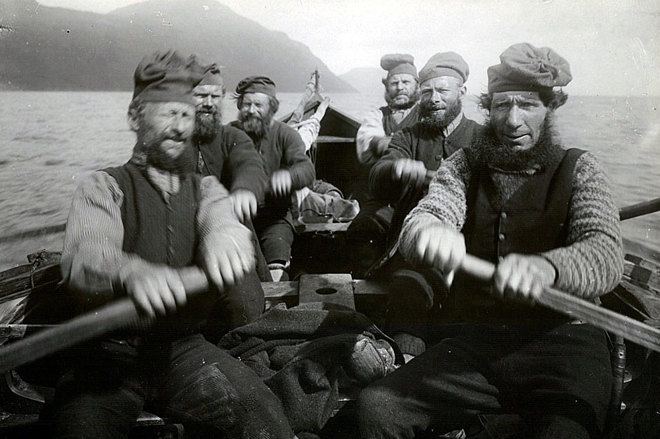
Emergence of a fisheries nation
A common expression says that the Faroese people are born with oars in their hands. The ocean has always been an integral part of life on the islands, the sea is rarely more than a few hundred metres away.
The Faroese have always lived off the sea, but until the late 1800’s the primary livelihood was agriculture and sheep husbandry. Until then, the Faroese did not have decked vessels, but would fish in traditional rowing boats. At the same time, the Faroe Islands where subject to a Danish trade monopoly that prevented free trade and commercial growth and modernisation.
The Faroese economy was traditionally a barter economy. The Faroe Islanders harvested, caught and produced what they needed for their daily lives. Other goods were exchanged with the Royal Danish Trade Company. The Faroe Islanders sold primarily wool and woollen clothing, as well as fish and feathers, in exchange for imported commodities, such as grain, timber and other goods.
Throughout the 1800’s plans to develop commercial fisheries in the Faroe Islands developed. Faroese men gained experience by sailing with foreign fishing vessels in the North Atlantic and efforts were made to establish fisheries in the islands with decked vessels.
In 1856, the trade monopoly was abolished. The pivotal turning point from an agriculture society to a fishing nation came in 1872, when “Trappubrøðurnir” - a group of brothers from Tórshavn - became the first Faroese to buy a decked fishing vessel - a smack boat called Fox.
These enterprising Faroe Islanders bought the Fox in Scarborough in the UK. The boat was cheap, as the British were moving from using sailing boats to using steamboats. For the first years, the Faroese fleet consisted mostly of old smacks and sailing ships bought in the British Isles.
The Faroe Islanders produced and exported salted fish that was salted and dried on rocks and stone-paved grounds in villages all around the islands.
In the years since, the Faroese fishing industry has seen a significant expansion and the now includes some of the most advanced fishing vessels and fish processing plants in the world.
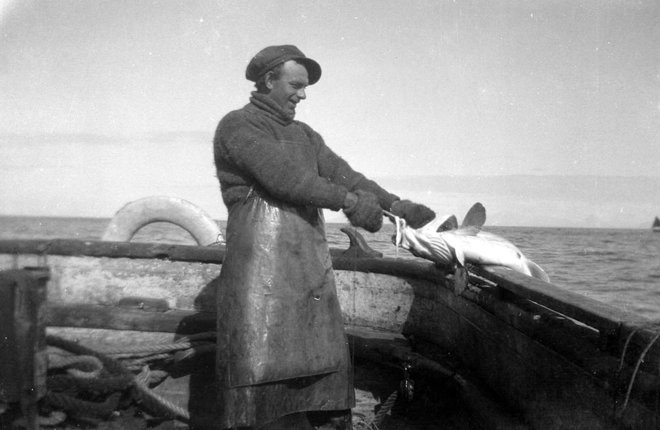
Fisheries in foreign waters and within the 200 mile fishery zone
Fisheries in other zones and in international waters have long been an important part of total Faroese fisheries. Faroese fishermen have a long tradition of fishing in foreign and international waters and have contributed to the development of many fisheries across the North Atlantic over the years.
Initially, Faroese vessels mainly fished in Icelandic waters. This was due to the fact that Faroese sailing boats could not compete with foreign trawlers fishing in Faroese waters. Later the Faroese also developed fisheries in other areas, including in Greenlandic waters, on the Flemish Cap and in the Barents Sea.
In the years after WWII, several nations began to expand their fisheries zones. This generated vast changes in fisheries and marine law around the globe. In 1964, the Faroese government extended the Faroese fishery zone from 3 to 12 nautical miles and in 1977 it was extended out to 200 nautical miles. This meant that the Faroe Islands now had full control over the marine resources in their waters.
The Faroe Islands have bilateral fisheries agreements with their neighbouring countries in the North Atlantic region – the European Union, Iceland, Norway, Russia and Greenland. These involve the exchange of fishing opportunities, which give foreign vessels quotas and access to the Faroese zone in exchange for fishing opportunities for the Faroese fleet in their zones.
These agreements provide Faroese fishing vessels with the scope and flexibility to pursue a variety of fisheries in the best seasons.
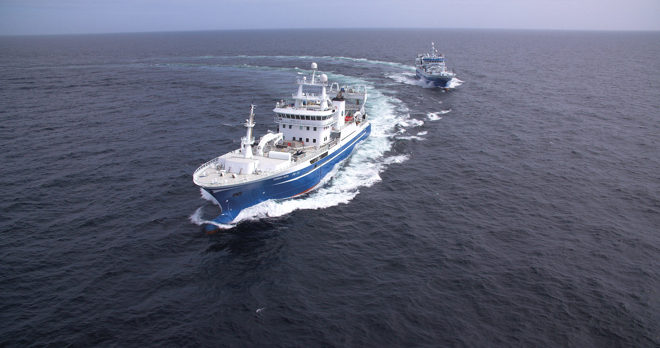
Aquaculture
The Faroese aquaculture industry dates back to the 1960’s. In recent years, the Faroe Islands have become a significant player on the international farmed fish market, especially with farmed Atlantic salmon.
Faroese farmed salmon is renowned for its exquisite taste and high quality, and today, farmed Atlantic salmon comprises half the total value of Faroese exports of goods.
The Faroe Islands implemented a uniquely stringent and comprehensive regulatory legislation regime for aquaculture in 2003. The main objective of the legislation is to guarantee the health and welfare of farmed fish by limiting external pressure and exposure to disease, with the aim of ensuring a sustainable production of farmed fish, while protecting the environment in the process.
The Faroese Veterinarian Act on Aquaculture is used as inspiration and guidance for the implementation of aquaculture standards in other countries around the world.
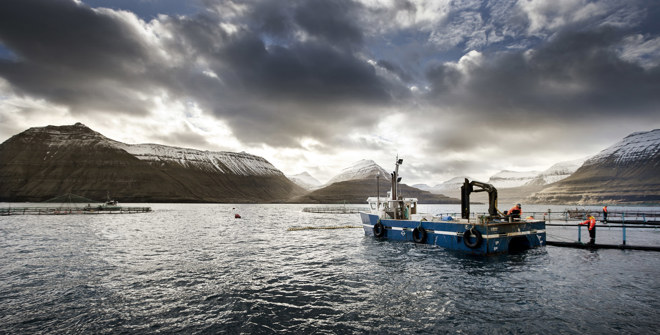
Social sustainability
As well as biological sustainability, Faroese policies on fisheries and aquaculture have a significant focus on social sustainability. A principal objective in Faroese resource policy is that utilisation of marine resources should benefit society as a whole and provide jobs all around the islands.
Faroese society is founded on the Nordic welfare model. The Faroe Islands have a well-organised labour market that provides the human capital necessary to drive a productive economy. It exists alongside the wider welfare system, which provides economic security and employment benefits.
The Faroese job market is organised in a similar way as in other Nordic countries and employees in the industries are paid according to collective agreements with Faroese unions.

